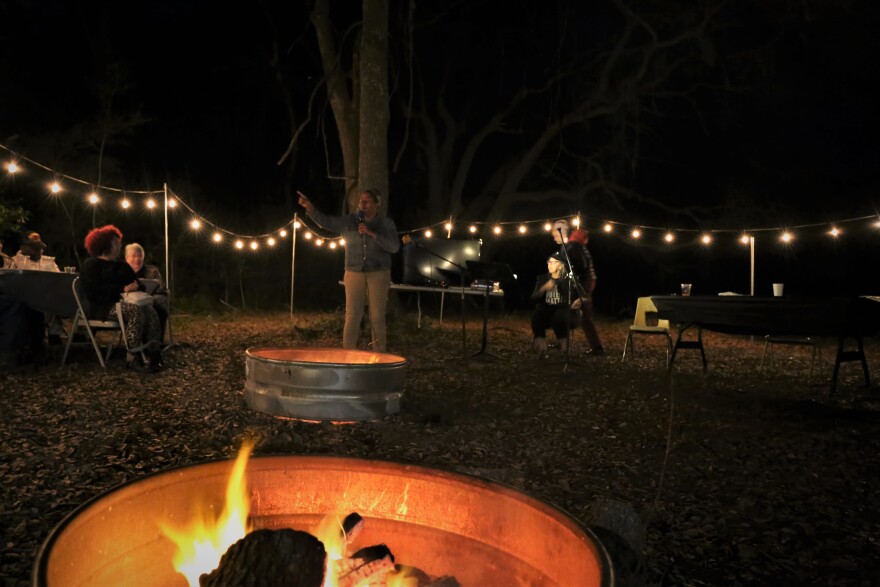There’s a certain mystery about travelling a dirt road especially on South Carolina’s sea islands.
Robert and Clara Trail on Saint Helena wanders and winds, kicking up dust on the tires. A couple of small homes disappear in the rearview mirror before the road’s eventual end reveals a homestead.
“I am going to check on the status of the hog,” says Belinda Jones as she darts across a field setting off an alarm of excitable chickens, ducks and posturing turkeys.
Belinda is checking on dinner; a whole hog being smoked beneath a canopy of live oaks. It’s carefully tended by hog farmer Marvin Ross who was recently featured in “The New York Times” for his revival of hog slaughters, a practice that was once a staple of Black, agrarian life.
Belinda’s husband Tony watches closely as Marvin flips the crackling beast. The couple also embraces ancestral traditions. But it wasn’t always their way of life.
“In fact, when I left Beaufort, after I graduated from high school, I made the promise I shall not return,” says Tony.
Leaving the Sea Islands
Tony joined the Army, fleeing the sea islands and the racism he endured growing up Gullah.
Gullah people are direct descendants of slaves who worked the area’s plantations but remained once freed. They lived isolated off the land speaking their own distinct language. They were often looked down upon as poor and uneducated.
Tony says he never looked back, even when his parents gave, he and Belinda more than 12 acres of family land. She was uneasy about property that had been a plantation.
“My first thought was like I wonder how many times something bad really happened out here.”
But once the couple retired and found land hard to come by, they began to appreciate the foresight of their ancestors gift. People who could not read or write had recognized the value of land and the self-worth owning it could create.
The Gift of Gullah Ancestors
Tony and Belinda returned to Saint Helena Island with their children and lived on the land they legally owned, clearing the trail named for Tony’s parents, Robert and Clara. They began farming much like their Gullah ancestors did.
The couple worked the land and the land worked for them. In 2015, they started selling their produce, poultry, eggs and pigs as part of a small business, Morning Glory Homestead Farms. They found customers curious, not critical of their Gullah heritage.
So, a year ago, they decided to host what they call “Gullah Campfire Supper with Stories and Songs” to teach people about Gullah culture, emphasizing the contributions of African Americans past and present. Each month, they invite special guest speakers.
But preparing a homecooked meal for two dozen guests is no small task. Tony has been given his orders. He’s back in the kitchen finishing the final but perhaps most crucial course.
“You can’t necessarily talk about having a meal without having rice with it,” he says.
Gullah Supper
Rice is often referred to as Southern cuisine, like collard greens, okra and field peas. But all these delicacies really have roots in Africa. In fact, Africans were brought to the sea islands for their ability to grow rice.
Outside, visitors are now gathering around Marvin and his mouth-watering friend. They fill their plates as the sun sets, cozying up to several campfires flickering beneath a string of lights. The glowing faces of the two women who have come to speak bely their dark tales.
“I can remember waking up at least twice, possibly more, in the middle of the night,” says Minerva Brown King. “And the KKK was burning crosses in front of our house.”

Stories
King grew up on the front lines of the civil rights movement. Her father was the president of the Charleston Chapter of the NAACP. Her sister Millicent was one of the first African American students to desegregate Charleston County schools.
Nearly a decade after the U.S. Supreme Court ruled racial segregation in public school unconstitutional, Millicent walked the long halls of a once all-white high school for the first time.
“Everybody would just go to the walls and cringe as if I were a leper,” she says.
The sisters' stories are powerful. People, Black and white, lean in.
Minerva and Millicent end the talk with one of their favorite spiritual songs of resolve, “The Welcome Table.” It’s believed to have been passed down by an enslaved child.
And songs
“Oh, I’m going to sit at the welcome table, going to sit at the welcome table one of these days, one of these days."
The sisters' voices trail off into the night.
Despite the late hour and the inevitable drive back, down that now pitch-black dirt road, visitors linger.
“This an amazing thing that has happened,” says Karen Green who recently moved to the area from Chicago. “We did have somebody, somewhere who held on.”
Green and others are amazed that people once enslaved held on to the very land they were forced to work. Tony and Belinda are grateful. Their ancestors also held on to hope; hope they would have a better life.
“It’s not just about how bad our past was,” says Belinda. “But how we’ve overcome and continue to move forward.”
Belinda smiles even as she looks out at the now empty campsite and the clean-up still ahead. The apprehension she felt about this land is gone.



